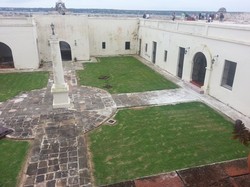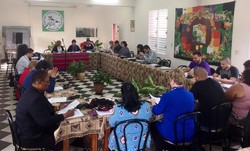Representatives from fifteen communion-members of the Alliance of Latin American Presbyterian and Reformed Churches (AIPRAL) and the Caribbean and North America Area Council (CANAAC) gathered recently for Gender Reading of the Signs of Times: Bi-regional Conversations with Accra +10.
The highly symbolic and contextual consultation was sponsored by the World Council of Reformed Churches (WCRC) and hosted in the Seminario Evangélico de Teología in Matanzas, Cuba.
The WCRC is holding bi-regional conversations that consider the impact of the Accra Confession ten years after its adoption in preparation for the WCRC’s 2017 General Council. The confession was adopted in 2004 by the General Council of the World Alliance of Reformed Churches in Accra, Ghana. It addresses issues of economic justice and the destruction of the earth.
Simultaneously, many American churches are examining the inclusion of the Confession of Belhar, which speaks to race and reconciliation. The Presbyterian Church (U.S.A.) will vote to add the confession to its Book of Confessions at its 222nd General Assembly (2016) in June.
Using the Accra and Belhar confessions as a framework, the Cuba bi-regional conversation focused on equity challenges to gendered and raced disparities in economics, political access, and social development prevalent throughout the breadth of the American region. Cuba served as an important grounding for these conversations.

The interior courtyard and former prison cells at San Severino Castle, one of the first ports of entry of the transatlantic slave trade. It’s now home to the UNESCO Slave Route Museum. Photo by Molly Casteel
Beginning the conversations and as part of establishing mutual learning and grounding, the group visited the San Severino Castle. Built with enslaved African labor beginning in the 1690s, San Severino served as one of the first ports of entry of the transatlantic slave trade, and as a distribution center of enslaved Africans through the 18th century. The castle now houses the UNESCO Slave Route Museum in Cuba.
The group also learned from leaders of the Iglesia Presbiteriana-Reformada en Cuba about the history and mission of the Cuban church, and participants engaged with Cuban economists and journalists on the history, advancements, and current challenges of Cuba’s economy, social reforms, and politics.
A panel conversation between Cuban gender studies professor, Ofelia Ortega, and Cuban feminist leader and journalist, Isabel Moya, focused on the cross-sections of gender in theological studies, sociopolitical construction, education, and economics.
The context, coupled with robust scriptural and theological conversations, led the group to articulate the lenses through which it reads violence in the region:
- gender studies as a tool for the empowerment of women and as a framework for the development of equitable gender relations and solidarity;
- discrimination based on race and origin as pervasive through the American region, particularly disenfranchising indigenous communities, persons of African descent, and peoples who are displaced and migrated;
- the complex and undeniable correlation between poverty, racism, and the undervaluing of women, and their sociocultural, political, and religious elements;
- the manifold manifestation of violence throughout the region, and the way it primarily and particularly affects women, children, and disenfranchised peoples; and
- the relation of the aforementioned to the environment, and it requiring the actions for protection and renewal from People of God.
Multiple convergences and areas for cooperation and joint missional work were recognized. Two proposals are a call for intentional exchange of pastoral leadership throughout the member churches of AIPRAL and CANAAC, and the encouragement for each communion to articulate political and social actions towards gender and environmental justice and against xenophobia in their countries, and for member communions and the regional organizations to organize ways to support each church in their national actions.
A pastoral letter will be distributed by the WCRC to member churches. A detailed summary of the meeting and list of proposed shared actions will go to participants.
Representatives of the PC(USA) at the gathering were challenged by the 42nd article of the Accra Confession: “now we proclaim with passion that we will commit ourselves, our time and our energy to changing, renewing and restoring the economy and the earth, choosing life, so that we and our descendants might live.”
“We return to our church committed to the challenges of this conversation, and looking forward to the many ways the PC(USA) will assume the calls of the forthcoming pastoral letter, and to continue to stand in solidarity with our sisters and brothers of the American continent,” the group said.
The PC(USA), a member church of CANAAC, was represented by Molly Casteel of the Office of the General Assembly. Also participating through relationship with AIPRAL were Miguel A. Rosa Morales; Gustavo Quintero-Casadiego; Yilza Saliva of the Synod of Boriquén in Puerto Rico; and Amaury Tañón-Santos of the Hispanic/Latino(a) Caucus.
The Reverend Molly Casteel is an Assistant Stated Clerk and Manager for Representation, Inclusiveness and Ruling Elder Training in the Office of the General Assembly. The Reverend Dr. Amaury Tañón-Santos is the Synod Networker for the Synod of the Northeast.
Conversaciones sobre Cuba con las iglesias Reformadas en las Américas

